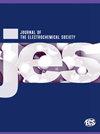基于 AuNPs/CS@cMWCNTS 的高灵敏快速酶生物传感器用于检测镰刀菌酸
IF 3.3
4区 工程技术
Q2 ELECTROCHEMISTRY
引用次数: 0
摘要
镰刀菌酸(FSA)是一种高灵敏度的生物标志物,可用于早期预警由镰刀菌感染引起的兰州百合鳞茎腐烂病。实现对其高灵敏、准确、快速的检测对于百合鳞茎腐烂病的早期预警和控制至关重要。本文基于酶抑制原理开发了一种酶生物传感器,用于快速检测 FSA。首先,通过滴涂法和电化学沉积法在裸电极上分别修饰了壳聚糖功能化的羧基多壁碳纳米管(CS@cMWCNTS)和金纳米颗粒(AuNPs)。随后,多巴胺β-羟化酶(DBH)通过金硫键被牢固地固定在电极表面。由于多巴胺(DA)转化为去甲肾上腺素(NA)的过程中,DBH 的活性会受到 FSA 的抑制,从而导致信号响应发生明显变化。在优化的实验条件下,该传感器在 1.00 × 10-5 μg ml-1 ~ 1.00 × 103 μg ml-1 的浓度范围内表现出良好的线性关系,相关系数为 0.9856,检测限为 4.60pg ml-1。此外,该传感器还具有良好的稳定性、重复性(RSD 1.85%)和选择性。将该方法用于兰州百合提取物中 FSA 的分析,回收率高于 97.59%,RSD 小于 1.383%。该方法实现了对实际样品中FSA的高灵敏度和快速检测,为农作物种植和生产中的病害预警和防控策略的准确实施提供了科学依据和技术支持。本文章由计算机程序翻译,如有差异,请以英文原文为准。
A Highly Sensitive and Rapid Enzyme Biosensor Based on AuNPs/CS@cMWCNTS for Detecting Fusarium Acid
Fusarium acid (FSA) serves as a highly sensitive biomarker for the early warning of bulb rot in Lanzhou lily caused by Fusarium oxysporum infection. Realizing its highly sensitive, accurate, and rapid detection is crucial for the early warning and control of lily bulb rot. Herein, an enzyme biosensor based on the enzyme inhibition principle was developed for the rapid detection of FSA. Firstly, chitosan-functionalized carboxylated multi-walled carbon nanotubes (CS@cMWCNTS) and gold nanoparticles (AuNPs) were modified on a bare electrode by drop coating and electrochemical deposition methods, respectively. Subsequently, dopamine β -hydroxylase (DBH) was firmly immobilized on the electrode surface through the gold-sulfur bond. Because the activity of DBH can be inhibited by FSA, which leads to a noticeable change in the signal response during the conversion of dopamine (DA) to norepinephrine (NA). Under optimized experimental conditions, the sensor exhibits an excellent linear relationship in the concentration range of 1.00 × 10−5 μg ml−1 ∼ 1.00 × 103 μg ml−1 with the correlation coefficient of 0.9856 and the detection limit is 4.60pg ml−1. Additionally, the sensor showed good stability, repeatability (RSD 1.85%), and selectivity. The method was applied to analyze FSA in the extraction from Lanzhou lily with a recovery higher than 97.59% and RSD less than 1.383%. This method enables the highly sensitive and rapid detection of FSA in real samples, and provides scientific basis and technical support for early warning of diseases and accurate implementation of prevention and control strategies in crop planting and production.
求助全文
通过发布文献求助,成功后即可免费获取论文全文。
去求助
来源期刊
CiteScore
7.20
自引率
12.80%
发文量
1369
审稿时长
1.5 months
期刊介绍:
The Journal of The Electrochemical Society (JES) is the leader in the field of solid-state and electrochemical science and technology. This peer-reviewed journal publishes an average of 450 pages of 70 articles each month. Articles are posted online, with a monthly paper edition following electronic publication. The ECS membership benefits package includes access to the electronic edition of this journal.

 求助内容:
求助内容: 应助结果提醒方式:
应助结果提醒方式:


